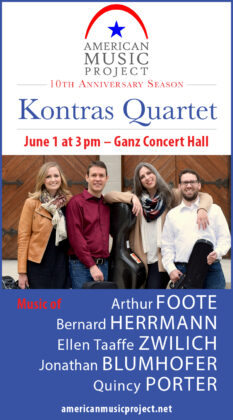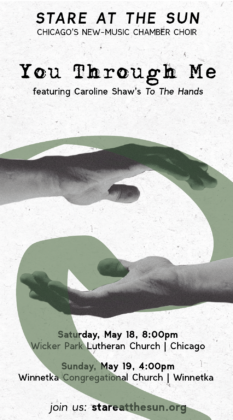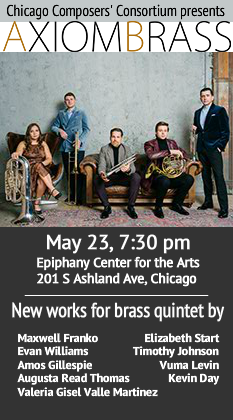MusicNOW wraps season with varied lineup of hits and misses
There’s something bizarre and rather alien about headset-wearing ushers traversing the aisles at a program of contemporary music while gravely and silently holding aloft water bottles for sale. Perhaps the thought is that the music would prove so daunting and arid that audience members would be in desperate need of hydration.
Such was not the case Monday night at the season-closing concert of MusicNOW at the Harris Theater. In fact, if anything many of the works performed by CSO members and guest artists seemed to make a point of being accessible and user-friendly, though not with equally successful results.
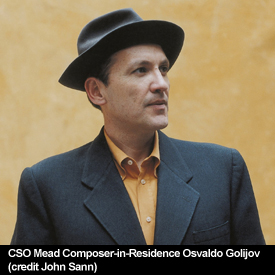
The Chicago Symphony Orchestra’s Mead composers-in-residence, Osvaldo Golijov and Mark-Anthony Turnage made an amiable duo of interlocutors, introducing their works and those of other composers.
The evening led off with Golijov’s Mariel for cello and marimba. Composed in memory of a friend who died in an accident, the work is characteristic of the Argentinian composer, cast in a long, winding soulful meditation for cello. Brant Taylor and percussionist Cynthia Yeh brought elegance, a widely terraced array of hues and dynamics, and the right dark, valedictory expression to this heartfelt music.
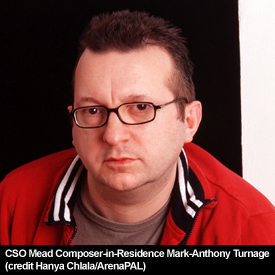
Turnage’s Out of Black Dust was presented in its American premiere. Commissioned by MusicNow, the work is scored for ten brass players (some doubling on percussion), and was conducted by Fulcrum Point’s Stephen Burns. The music was inspired, says Turnage, by the music of Led Zeppelin and, more directly, the composer’s friendship with the band’s bassist John Paul Jones and his wife.
Out of Black Dust reflects Turnage’s populist style, yet there is a sense here of the composer rather mechanically going through the rock-vamp motions. The music is well crafted in its spread among ten players, but too unvaried with little of the fluency and edge of Turnage’s Scorched heard last month, much less any suggestion of Zeppelin’s screaming heavy-metal fury. While played with customary polish and gleaming brilliance by the CSO brass, a greater sense of swing and less metrical rhythms may have made a stronger impression.
Another MusicNOW commission, Self Destruct by laptop composer Jeremy Flower was given its world premiere. Scored for viola, two cellos, piano, marimba and laptop, Flower’s work was inspired by the composer’s feeling of being “stressed out.”
With that impetus, and the electrocoustic possibilities, one expected something audacious, but even with the laptop gadgetry, there’s nothing in Flower’s conservative music to frighten the horses. After a slow introduction, the music largely consists of a sugary melody repeated in various guises against a varied counterpoint of electronics, piano, percussion and strings. The music was well performed by all, violist Li-Kuo Chang in particular, but Flower’s composition is thin to the point of ephemera, sounding less like concert music than Windham Hill aural wallpaper.
By far, the most intriguing work on the program, as well as the oddest, was Three Roads by Michael Ward-Bergeman. The composer sets three vocal texts having to do with the road by Dante, Robert Frost and Whitman, which are vocalized by singer-violinist Christina Courtin and backed by six musicians, including Ward-Bergeman on his amplified “hyper-accordion.”
About halfway through the work Courtin stops singing and starts to take apart her violin, systematically destroying the instrument until she has broken it into small pieces, an act as unexpected as it seems completely disassociated from the texts.
That lame bit of retro-1960s silliness apart, Three Roads showed Ward-Bergeman to be an intriguing and individual compositional voice. The poetic stanzas are not cast as songs, but more explorations of the texts’ rhythmic and sonic expressive possibilities. Courtin’s slender untrained voice has a certain artless appeal though she was painfully stretched in the high register by Ward-Bergeman’s writing. Most striking was the composer’s keen ear for unusual timbral colors, as he skillfully mixes piano, flute and alto flute, double bass, laptop and dombro, Ward-Bergeman’s own souped-up accordion contributing a nicely evocative Left Bank café feel as well.
Posted in Performances

